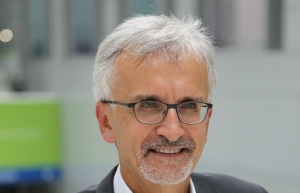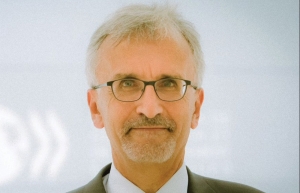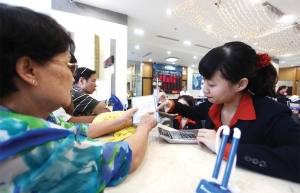OECD: Reforms can boost economic and social progress
 |
| Patrick Lenain, CEP senior associate |
The OECD report is very positive about Vietnam’s economic prospects. It notes that the country has made remarkable progress during the past three decades. Active participation in global value chains has brought strong growth, especially foreign investment in export-oriented manufacturing. Besides large multinational enterprises, many small businesses play an important role in domestic economic activities. Nonetheless, the report notes that not all Vietnamese people have benefited from this economic upheaval. A vast number of people are not yet covered by social security, despite the acceleration in population ageing.
Strong recovery after COVID-19
The pandemic has been smoothly managed, and Vietnam has been quick to recover from the downturns caused by periods of health confinement. Swift and tailored sanitary measures meant Vietnam did not experience large-scale contagion until mid-2021. Thereafter, the vaccination campaign was fast. Economic growth outperformed most other Southeast Asian economies through the pandemic, providing a solid basis for further economic progress.
Nevertheless, worldwide macroeconomic conditions are currently unclear due to geopolitical tensions, high inflation, fragile banking systems, and unsustainable public debt in many countries. Active participation in global trade has been a source of prosperity, but it means that the country is exposed to abrupt changes in external conditions.
In the short term, the OECD expects growth to remain solid. Real GDP is projected by the organisation to grow by 6.5 per cent this year and 6.6 per cent in 2024. Downside risks include the worsening of geopolitical tensions, more banking turmoil, and severe debt-servicing difficulties in developing countries. On the upside, foreign investors could arrive in larger numbers in recognition of the stable investment climate in Vietnam.
As in many other countries, Vietnam’s inflation accelerated due to rising energy and commodity prices, but it has come down recently, to 2.81 per cent as of last month, closer to the State Bank of Vietnam's targets. Lower inflation is good news because fast-rising consumer prices erode the purchasing power of households and weigh down the nascent recovery of private consumption. High inflation has an especially harsh impact on poorer Vietnamese households, who must pay more for their food and energy. The OECD therefore argues that maintaining price stability should remain the primary focus of monetary policy.
Sharing prosperity
The report also says that fiscal policy has been prudent, so there could be room to manoeuvre in the case of an unexpected economic downturn or to support vulnerable groups. Improving social protection should be a priority as the country prepares for an ageing population.
By 2050, the old-age dependency rate will increase from the current 11 per cent to 33 per cent, to be one of the highest in Southeast Asia. Vietnam’s social security system has already evolved to avoid leaving many people behind. Health insurance now covers almost 90 per cent of the population. During the pandemic, unemployment insurance helped those who had lost their jobs.
Social indicators in Vietnam and OECD countries
| Indicators | Vietnam | OECD average |
| Life expectancy at birth (years) | 75.5 | 79.7 |
| Employment rate (per cent) | 71.2 | 56.2 |
| Men employment rate (per cent) | 75.9 | 64.1 |
| Women employment rat (per cent) | 66.6 | 48.7 |
| Unemployment rate (per cent) | 2.4 | 6.1 |
| Income inequality (GINI coefficient) | 0.36 | 0.32 |
| Health care spending (per cent of GDP) | 5.2 | 9.7 |
| Education spending (per cent of GNI) | 4.6 | 4.4 |
| Tertiary education attainment (per cent) | 13.5 | 39.0 |
Source: OECD
Nevertheless, the public pension covers only one-third of the labour force. Pension coverage depends on employment status, with limited protection available to self-employed workers, who account for half of the total employed. The OECD therefore recommends expanding the tax-funded social pension to include vulnerable old-age people. This could be made easier by tackling informality, especially the weak compliance of small businesses in making social insurance contributions. Restricting early exits from the labour market is also important to strengthen the pension system sustainability.
The OECD report argues that Vietnam needs to mobilise more revenue as it faces growing expenditure needs, besides population ageing, in the future. There will be growing pressure to invest in transport, digital, and green infrastructure. Deductions and exemptions in corporate and personal income tax should be phased out, and the reduced VAT rate should be applied more selectively. In addition, the tax on non-agricultural land should be replaced with a recurrent tax levied on both buildings and land.
Making Vietnam more business-friendly
According to the OECD, Vietnam’s business climate could be further improved. This would entice investment in advanced technologies and boost the country’s productivity, which is key to long-term prosperity. Though administrative procedures have been facilitated, especially in some provinces, more could be done to expedite them. Ensuring a level playing field between different types of businesses is also vital for creating a better business climate. The competition authority should be given more power to ensure fair treatment of all market participants – both privately owned and state-owned enterprises.
There is scope for improvement on competition restrictions when compared with other emerging economies. State involvement is still strong in some sectors, where state-owned enterprises are dominant, notably in energy, transport, and telecommunications. In addition to reducing entry barriers, the OECD suggests renewed efforts to improve the governance of state enterprises are urgently needed. Continued initiatives to tackle corruption are also crucial to improve the overall business climate.
More digital investment
Vietnam is among the leaders of digitalisation in Southeast Asia, and there is scope to do more on all fronts. Uptake of digital tools has grown fast, and adoption of digital technologies, such as e-commerce, telemedicine and telework accelerated during the pandemic. Vietnam is a hotbed of digital startups and home to three digital unicorn companies (private startups with values over $1 billion). Like in many other countries, the digital transformation has been changing many facets of the economy. The government has been quick to deliver digital services, and digital and cashless payments have become more common.
There is room for further improvement in digital infrastructure, especially investment in fibre optics. This would boost uptake and the dissemination of advanced digital technologies. Greater liberalisation in the telecommunications market is also crucial to stimulate digital investment. Because digital skills are crucial to promoting digitalisation, more resources should be allocated to technical and vocational education and to on-the-job training. Regulations for cross-border data flows should also be eased, while strengthening data privacy protection and cybersecurity.
Net-zero carbon emissions
The OECD calls for bolder policy action to achieve net-zero carbon emissions in 2050. It welcomes the fact that Vietnam has committed to carbon neutrality, as past economic growth has been fuelled by rising energy consumption, mostly from fossil fuels. However, as the contribution of hydroelectric power declines, coal has once again become the major source of energy. As a result, carbon emissions are increasing fast. Reducing the intensity of high-emission production is crucial to simultaneously achieving both low-carbon emissions and fast economic growth.
The report calls for a comprehensive programme to transition to a low-carbon economy. To guide all economic sectors to a low-carbon path, a clear and predictable long-term climate strategy should be prepared. This strategy should include energy sector reform, which is crucial to upscale investment in renewable energy. All fossil fuels are now subject to the environmental protection tax, but it is difficult to reflect the social costs of carbon fully. This should be improved to influence the consumption patterns of households and businesses more explicitly.
The OECD welcomes the planned carbon market but recommends accelerating its implementation as it would encourage new business investment in renewable energy. Climate finance also has a role to play, as it does in other countries, to channel bank lending and equity investment towards new energies. Adopting a green taxonomy would greatly contribute to an understanding of which energy sources contribute to Vietnam’s goal of becoming fertile ground for future energy investment.
 | Can Vietnam achieve its goals on net-zero emissions? Vietnam’s economic achievements have been impressive over recent decades but greenhouse gas emissions have risen alongside them. Patrick Lenain, former assistant director at the Organisation for Economic Co-operation and Development, looks at the carbon market for this country moving forward as it tries to meet major emission-reducing targets. |
 | Assessing risks of inflation for everyday life in Vietnam While inflation has soared around the world, Vietnam has successfully kept it low. However Patrick Lenain, senior associate at the Council on Economic Policies, writes that it is too soon to claim victory because new bursts in food prices could occur, putting at risk the health of undernourished people. |
 | Developments for Vietnam to watch in midst of bank crisis The banking system is bracing for difficulties after the events surrounding Silicon Valley Bank, Credit Suisse, and others. Patrick Lenain, senior associate at the Council on Economic Policies, shared his views on what should Vietnam watch for during this period. |
What the stars mean:
★ Poor ★ ★ Promising ★★★ Good ★★★★ Very good ★★★★★ Exceptional
 Tag:
Tag:
Related Contents
Latest News
More News
- France supports Vietnam’s growing role in international arena: French Ambassador (January 25, 2026 | 10:11)
- Foreign leaders extend congratulations to Party General Secretary To Lam (January 25, 2026 | 10:01)
- Russian President congratulates Vietnamese Party leader during phone talks (January 25, 2026 | 09:58)
- Worldwide congratulations underscore confidence in Vietnam’s 14th Party Congress (January 23, 2026 | 09:02)
- Political parties, organisations, int’l friends send congratulations to 14th National Party Congress (January 22, 2026 | 09:33)
- 14th National Party Congress: Japanese media highlight Vietnam’s growth targets (January 21, 2026 | 09:46)
- 14th National Party Congress: Driving force for Vietnam to continue renewal, innovation, breakthroughs (January 21, 2026 | 09:42)
- Vietnam remains spiritual support for progressive forces: Colombian party leader (January 21, 2026 | 08:00)
- Int'l media provides large coverage of 14th National Party Congress's first working day (January 20, 2026 | 09:09)
- Vietnamese firms win top honours at ASEAN Digital Awards (January 16, 2026 | 16:45)



















 Mobile Version
Mobile Version